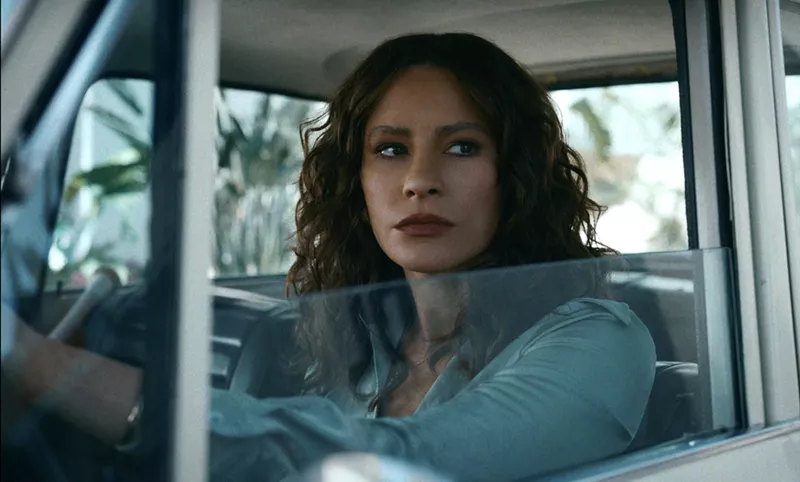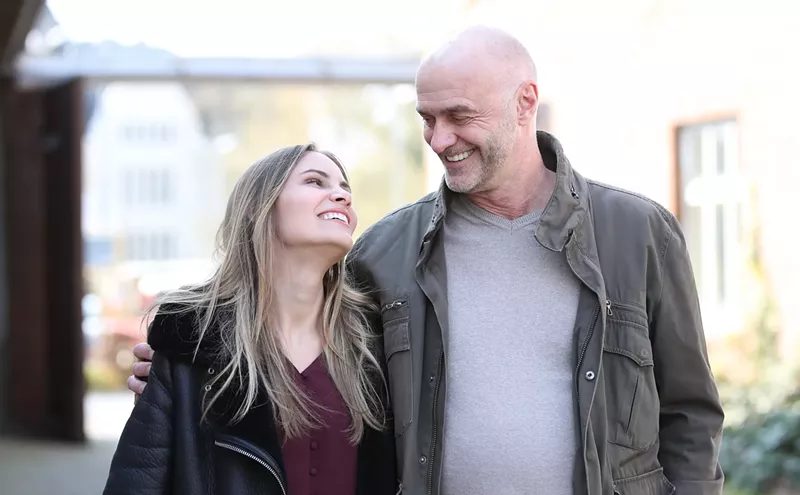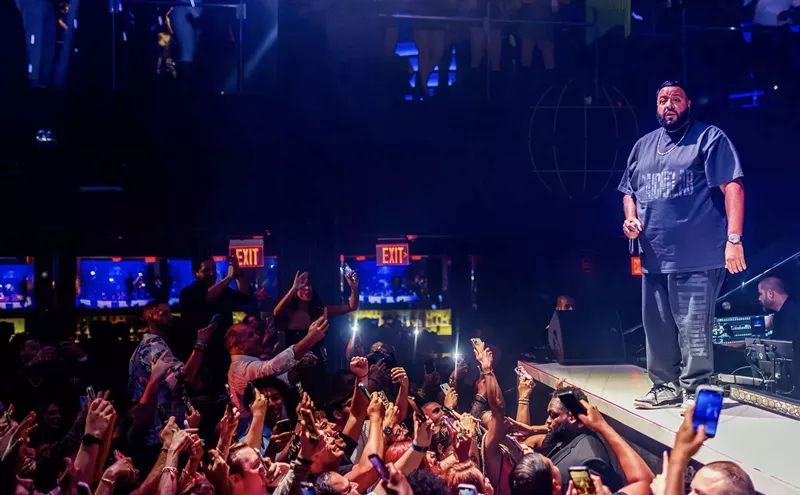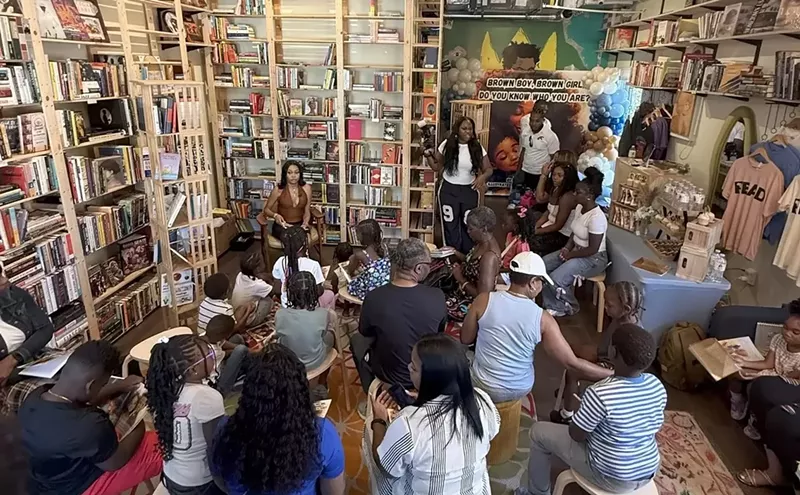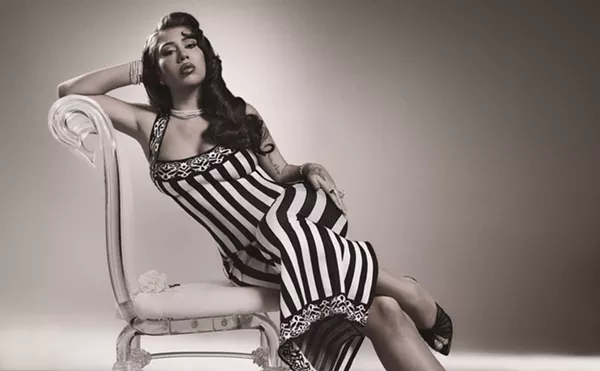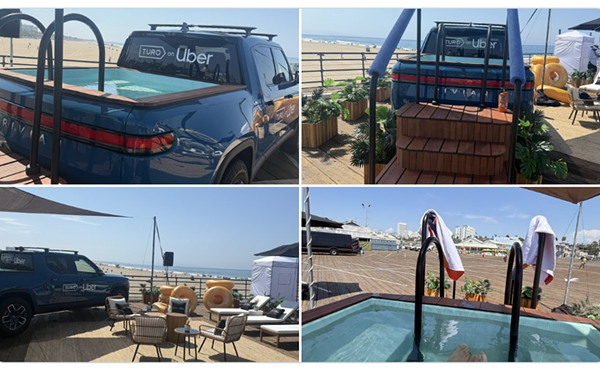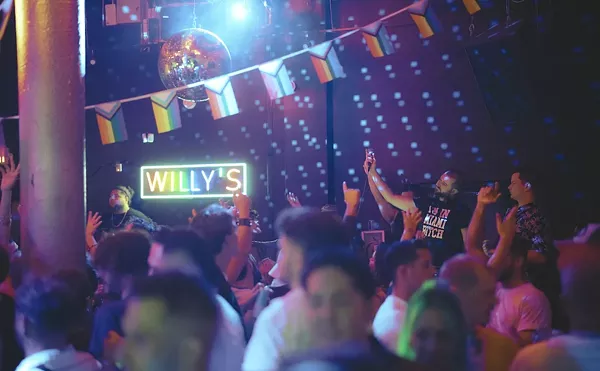The show doesn't tell us right away how Griselda came to be targeted, but it does tell us that this is 1978. Griselda calls Carmen (Vanessa Ferlito), a friend in Miami, then flies to Florida with her three kids, explaining on the way to the airport that she's divorcing her second husband and seeking a fresh start.
The arrival in Miami leans toward single-mom sitcom. "No cursing," Griselda says. "And put the fucking toilet seat down." Carmen and Griselda go out to dinner, where they bid good riddance to bad husbands and Carmen offers Griselda a job at her travel agency. That night, when everyone is asleep, Griselda opens her luggage, pulls out a teddy bear for her youngest son, then fishes around in the bag until she finds a giant brick of cocaine. The soundtrack swells.
Griselda is, of course, a real person, as established by the onscreen quotation that precedes the opening scene: "The only man I was ever afraid of was a woman named Griselda Blanco. —Pablo Escobar." The actual Griselda, born in 1943, endured a childhood filled with tragedy. Subjected to abuse from her mother's boyfriends, she resorted to street crime, prostitution, and drug dealing. While still in her teens, she and her first husband, Carlos, set up shop as marijuana dealers. Entrepreneurial skill and desperation pushed her forward, and by the mid-1960s, she had a new husband (Alberto Bravo) in a new city (New York) where she was dealing a new drug (cocaine). A decade later, after an indictment, she and Alberto fled back to Colombia. Things didn't work out — though in a manner that was far knottier than the fictional tale Griselda tells her kids — and she wound up in Miami, trying to build her own operation. That's where we come in.
Griselda, the show, never strays far from Griselda, the woman. In that, it is a thoroughgoing showcase for Vergara. The actress is from Barranquilla, about two hours north of Medellín. She knows the language, the culture, and the period. But in other ways, she seems like an extreme mismatch. Most of her roles (Modern Family, most famously) have been comic, and most have both foregrounded and subverted her pinup-girl looks and heavy accent. Here, the accent isn't an issue, and the looks are largely concealed under copious makeup and prosthetics. The disguise seems to free up Vergara, who plays Griselda as a creature of pure will hellbent on getting more power and more money and leaving more bodies in her wake. The occasional moments of doubt or regret aren't credible to us, and maybe they're not credible to Griselda herself.
Most scenes follow a pattern: obstacle appears, obstacle is obliterated, rinse, repeat. Griselda shows up at the Mutiny, the same Miami hotel featured in Scarface (although this re-creation, like the rest of the movie, was shot in California). Everyone is dancing to Donna Summer's "Hot Stuff." She quickly makes contact with a small-time dealer and turns him on to her product. "You know your shit," he says.
"Not the garbage you're used to," she says.
She moves a kilo (victory!), but then it's stolen back when the small-timer follows her out to the car and beats her up (setback!). Her only option is to hide near his car with a baseball bat and take back what is hers (victory!).
Flashbacks establish that she's an old hand at this kind of thing. In pre-Miami Colombia, she's in the car with Alberto, who's panicking about paying off his source, who also happens to be his brother. He proposes that she have sex with said brother to cancel the debt (setback!), which she does (victory?). But then she murders Alberto (setback?). Wins and losses collapse into each other from the start. (In real life, this was not the first time Griselda dispatched a husband — she had husband number one, Carlos, executed — and it wouldn't be the last. She also ordered the death of number three when he kidnapped one of her sons — a son, by the way, named Michael Corleone Blanco, a hat-on-a-hat name if ever there was one.)
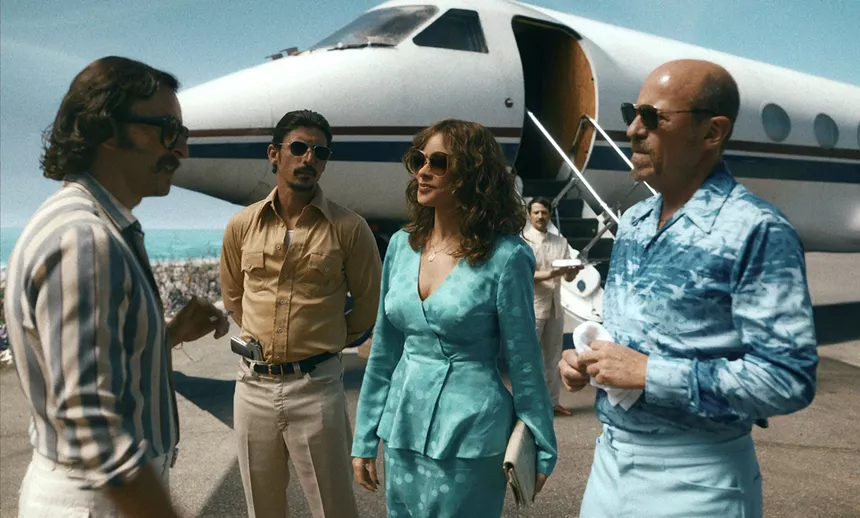
Camilo Jiménez Varón, Alberto Guerra, Sofía Vergara, and Diego Trujillo in a scene from episode three of Griselda
Netflix photo
That's the first episode. There are five more. The muscle back in Colombia wants Griselda dead, as does the competition in Miami. She imports her trusty accountant along with a dozen or so prostitutes who begin as mules and then become her street team, selling coke to rich white clients. Two detectives, Bill Jensen (Taylor Handley) and June Hawkins (Juliana Aidén Martinez), get wind that there's a new player on the scene, though Jensen can't fathom the idea of a female mastermind and Hawkins is a kind of right-side-up Griselda: smart, tenacious, divorced with a son, besieged every day by idiotic sexism. This theme starts to sag as it is overloaded, though around the edges, some scenes pack power. In a bordello back in Colombia, a cartel hit man looking for Griselda interrogates two prostitutes, who are amused that he can't believe Griselda figured out how to counterfeit without a male mentor. One of the women straddles him. The hit man points at the other and says, "She's more my type." The woman on his lap smiles and scowls, reaching down, grabbing him, and twisting hard enough to hurt. "Too bad," she says.
That the smaller scenes stand out attests to one of the main qualities of the series: It's a unified work, with all six episodes directed by Andrés Baiz, a veteran of Colombian TV and film best known to American audiences for Narcos. The art direction and set direction get plenty right, from cars to mustaches to rotary phones, and the intelligence of the production extends to the needle drops, which aren't mind-numbingly obvious. Sure, there's Donna Summer and, even more predictably, Miami Sound Machine, but there's also Harry Nilsson, Chilly, Serge Gainsbourg's "Black Trombone," and Miami funk band Coke, with its 1972 hit "Na Na."
Ultimately, though, the proceedings come to feel monotonous. Choices are made in the service of storytelling economy, but not enough of them, and in the course of playing out every string, many are left to go slack. Griselda has no true build, to the point where the last few episodes seem rushed (setback!). In the end, it suggests that while a woman can do anything a man can, a six-episode arc cannot do anything a movie can. A limited series is, well, limited.

